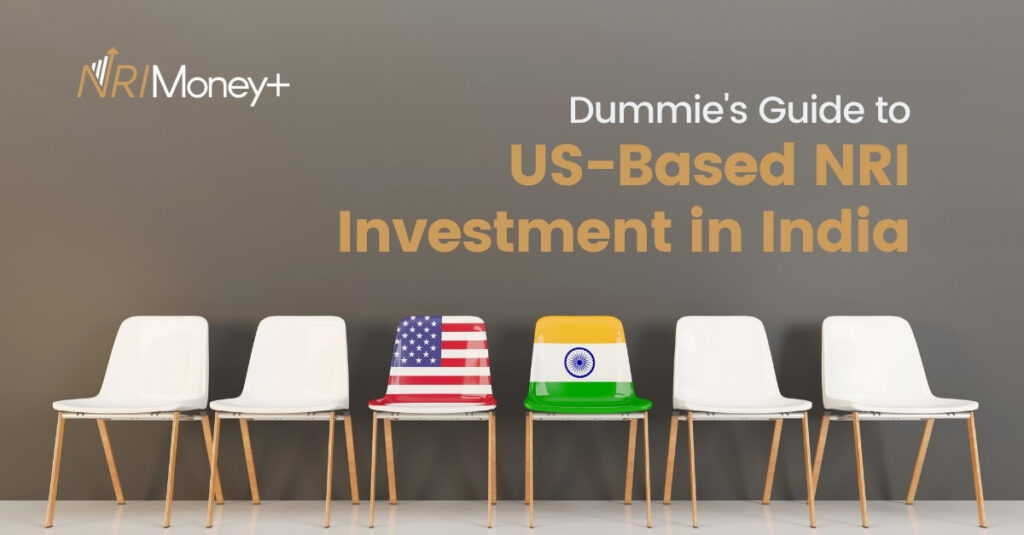Consider this. before we talk about NRI Investment in India. Living in the United States on a visa opens you to a world of possibilities. You make money in US dollars and work in the world’s most powerful economy. But, as a non-resident Indian (NRI), do you have the legal right to invest in India? What are your alternatives for making an NRI investment in India?
Below, we look at the greatest investment options for NRIs in India, as well as how to fund your NRI investment in the United States, or possibly any other country.
Who is a Non-Resident Indian (NRI)?
A non-resident Indian (NRI) is an Indian citizen who has spent less than 183 days in India during the fiscal year (or tax year). The fiscal year runs from April 1 to March 31 of the following year. This means you have to spend more than 182 days outside of India between April 1st last year and March 31st this year. NRIs are still Indian nationals, however, they do not pay taxes in India.
NRIs frequently find it difficult to invest in India. Below, we’ll go through the basics of solid NRI investing possibilities in India, but first, let’s look at why it’s so vital to invest.
4 Reasons Why an NRI Should Invest in India
Here are four reasons why you should invest and seek the best investment in India for NRI.
Prepare for Retirement
It’s never too early to start planning for your golden years. Actually, it should have started the day before yesterday. To achieve a secure retirement plan, you must put money aside in several forms of investment. The style of life you can afford when you retire is determined by the amount of money you save and invest.
Get Returns
When money is spent wisely, it generates additional income. Putting money into the stock market is a fantastic example of this. The interest rate or growth rate on your NRI investment in India will determine how much your money grows. An investment’s interest rate usually indicates how hazardous it is. A higher interest rate indicates that the investment is more risky. Invest sensibly to ensure decent results while avoiding unnecessary risk.
Send Money to Family
Your current pay should be sufficient to support you and your immediate family. However, if you invest in NRI investment alternatives in India, you would have greater disposable money. You can transfer some of your spare money to family members back in your own country. Better yet, converting dollars to rupees may provide your family with the assistance they require.
Build Financial Assets
Investing allows you to increase your financial wealth and possessions. Purchasing real estate, for example, means that it can be rented out for rental revenue. It can also be used as collateral when you seek loans. Secured loans provide lower interest rates, resulting in lower borrowing costs. The greatest NRI investment in India can help you build your financial assets as quickly as possible.

8 Best Options for NRI Investment in India
Many NRI’s live under the misconception that they aren’t allowed to invest in India. But that is simply not true. Here are the 8 best investment options in India for NRIs.
1. Fix Deposit Bank Accounts
This is probably the most common form of NRI investment in India. With a fixed deposit, you deposit money into an account and it is kept safe for a predetermined amount of time. You can’t withdraw the funds before the period is over. The money plus the interest is paid out to you after the period has ended.
Three Types of Fixed Deposit Accounts
There are three main types of fixed deposit accounts that serve as NRI investment in India:
Non-Resident External Account (NRE) – The money of such an account is kept in rupees. It’s easy to return the money to dollars. Interest rates on these accounts vary depending on the deposit size and/or bank.
Non-Resident Ordinary Account (NRO) – This account type is generally used by NRIs to control their Indian income. Rent income, dividends from investments, or pension funds can be paid into these accounts. These accounts have a current limit of $1 million that is allowed to be transferred from this account to a U.S. account per year. Take note the interest earned on an NRO fixed deposit is taxed at a rate of 30%.
Foreign Currency Non-Resident (FCNR) – Foreign currencies are stored in these accounts. It helps to avoid the currency fluctuations that take place in financial markets. The currency you deposit into the account will determine its interest rate of it. You can take money from this account at any time and it is not taxed by the Indian government.
2. Mutual Funds
Mutual funds are large pools of money of investors’ money which is managed by qualified and certified professional fund managers. Mutual Funds currently operate under strict regulations of the Securities Exchange Board of India (SEBI). Mutual funds are a bit riskier than fixed deposits, but that is why the returns of mutual funds are more than that of fixed deposit accounts.
An NRI needs an NRE, NRO, or FCNR account in India to be able to invest in an Indian mutual fund. These accounts help to facilitate the investment and payout process.
Mutual funds have two predominant categories and they are taxed differently.
Equity Funds – More than 65% of the fund contains stocks (equity). You will pay 15% tax if you sell the investment within the first year. The investment is tax-free after owning it for more than one year.
Debt Funds – Less than 65% of the fund is invested in stocks (equity). NRI’s pay 30% tax after selling it within 3 years of owning it. You will only pay 20% tax when you sell it after owning it for more than 3 years.
3. Direct Equity
You can always invest your money into stocks on the National Stock Exchange of India Ltd. (NSE) if you feel you have enough knowledge. You will need to be part of the Portfolio Investment Scheme (PINS) of the Reserve Bank of India (RBI). This will allow you to trade stocks on the NSE.
You will need the following three things:
- An NRE/NRO savings account is dedicated only for your PIS purposes.
- A dematerialized account that holds shares in an electronic form.
- A SEBI trading account with a registered broker.
4. Real Estate
Investing in a property is one of the favourite NRI investment in India. It serves as a good long term investment with steady growth (provided the property is in the right location). Make sure which type of bank account you use to buy and sell a property (NRO, NRE, or FCNR). The rules applicable to the account will determine how much money you will be allowed to return to dollars in the end.
5. Bonds and Non-Convertible Debentures (NCDs)
Bonds and NCDs have risk involved, but they can also serve as a good investment option.
There are three main bond categories:
- PSU Bonds – Public Sector Undertakings Bonds (PSU) contract with a maturity date. You in effect loan money to a company and they promise to repay it with interest on a specific date (called the maturity date). The interest rate on a PSU will be determined by the creditworthiness of the company that issues it. These investments are taxed at 20% if you sell them after owning them for more than 3 years.
- Non-Convertible Debentures (NCD) – This debt is secured by the company’s assets. The interest rate will, therefore, be a bit lower as secured debt has less risk involved. But, the interest rate on NCDs will still be very competitive when compared to returns on investments like equities.
- Perpetual Bonds – These bonds don’t have a maturity date so there is no date by which it pays out. The issuing company, however, promises to pay the holder a set amount of returns per year. The holders of perpetual bonds trade it on the open market. Market conditions and your willingness to sell will determine if you make a profit with the selling of this investment.
6. Government Securities
The government also provides investment opportunities.
Treasury bills or T-bills typically have maturity dates ranging between 3 and 12 months. T-bills are bought at RBI auctions. It does not earn the investor any interest but it’s promised to be redeemed at a discount. This means you will make a specific profit when the T-bill is redeemed.
For longer-term investment strategies, NRI’s can look at the following types of dated government securities:
- Fixed-rate government bonds – The interest rate on this bond is fixed.
- Floating rate government bonds – The interest rate on this bond will change according to the market-related changes.
- Capital index bonds (CPI bonds) – These bonds have a coupon payment rate that is adjusted according to the inflation rates of the Indian market.
7. Certificate of Deposits
Certificate of Deposits (CDs) is usually used as a short-termed investment. It almost works like a fixed deposit, but the holder of a CD may sell it. You need a dematerialized account to buy and sell CDs. A CD has a maturity date by which it promises to repay a certain amount. Please note, amounts invested into CDs are typically very hard to return to dollars.
8. National Pension Scheme (NPS)
This pension scheme allows Indian citizens to save for retirement. You need to be between the ages of 18 and 60 to become a member of the NPS. There are two accounts each with its own rules and regulations.
Tier 1 Account – All payments and funds in this account are locked until retirement. If you retire before the age of 60 you may take 20% of the investment as cash. You are obliged to invest the rest into an annuity (an investment that pays you a fixed yearly amount). Retiring after 60 will allow you to take 40% as cash and the rest must be invested into an annuity.
Tier 2 Account – Only tier 1 account holders are allowed to open tier 2 accounts. Tier 2 accounts are unrestricted so you can deposit and withdraw money as you wish. You can also decide how the portfolio of your tier 2 account is structured. There are many types of investments that you can choose from to help you to create a diversified investment strategy.
An NPS is not exempt from tax. The capital gains aren’t taxed, but all payouts are taxed according to your tax slab (the tax bracket under which your Indian income is classified).

Are There Personal Loans in the U.S. for NRI Investment in India?
There are great investment NRI investment options in India and you might be wondering how you can utilize it. The good news is you can get a personal loan in the U.S. to invest in India. Taking a loan with a low-interest rate and investing it into something with a higher interest rate can help to get you positive returns and build your financial wealth by finding the best investment for NRI in India.
Conclusion
NRI’s have great investment options in India. You may be living in the U.S., but you can still take part in the economy back home. Make sure you utilize the best investment in India for NRI by using a personal loan for a non-U.S. citizen. If you use it wisely you will reap the financial benefits in the long run.
Financial matters are complex, more so if you are an NRI. But managing them is not impossible.”

Donald G. is the Principal Consultant at NRI Money+. He specialises in creating personalised financial plans for NRIs (Non-Resident Indians) and HNI (High Net-worth Individuals).




